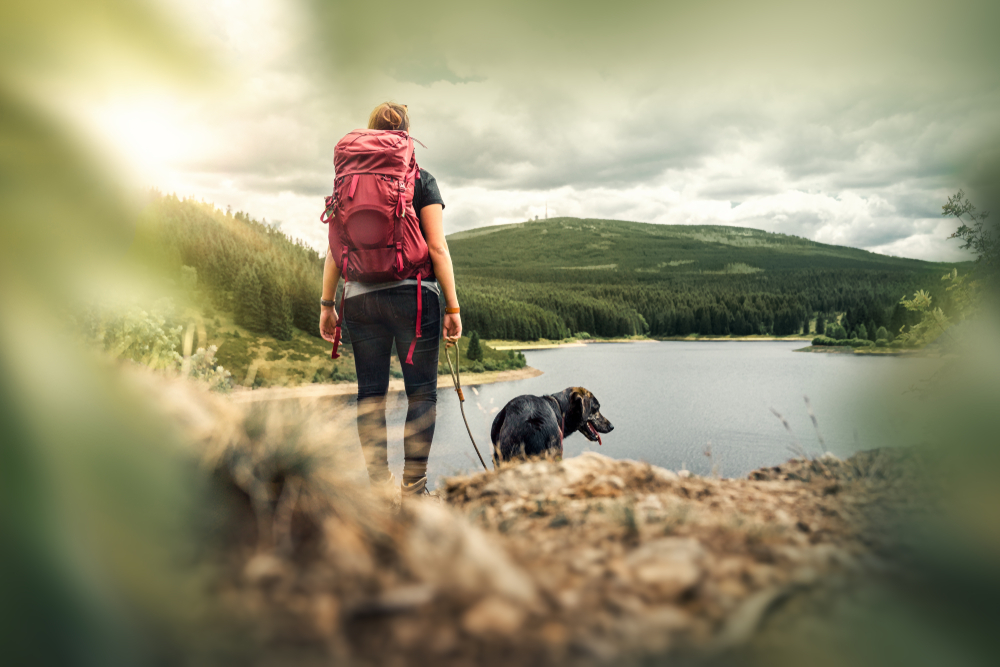You enjoy your dog’s company, and you believe your upcoming camping trip will be the perfect way to spend quality time with them. The team at Acorn Animal Hospital wants to give you some guidelines to follow to ensure your trip is a success.
#1: Ensure your dog is a “camping dog”
Not all dogs are suited for camping and hiking excursions. Honestly consider a few factors before setting out on your trip.
- Is your dog healthy enough for the trip? — If your dog’s typical daily exercise is a slow stroll around the block, they are likely not fit enough for a strenuous hike. Older dogs may also suffer from arthritis, making long hikes over uneven terrain difficult. Having your pet evaluated by our team at Acorn Animal Hospital will ensure they are healthy and fit enough for the trip. During the visit, we can also ensure their vaccines are current and they have been given an appropriate preventive against parasites, such as fleas, ticks, and mosquitoes.
- Is your dog leash trained? — Most campsites and hiking trails require your dog to be on a leash at all times. If your dog is resistant to being kept on a leash, your trip may be frustrating for both of you.
- Is your dog aggressive around other dogs or people? — You don’t want your fun camping excursion to end because your dog gets in a fight with another dog or bites someone. If your dog is usually hostile toward dogs and people they don’t know, you should probably leave them at home. If the issue is only an occasional problem, you can consider having your dog wear a muzzle when around other people and dogs.
- Is your dog a barker? — Your fellow campsite patrons will be upset if your dog barks all night long. If your pet tends to bark at anything that moves, you should look for a campsite well away from other campers.
#2: Ensure your dog is allowed at the site.
Check the camping site’s web page before your trip to ensure dogs are allowed on the premises. You should be respectful of the site’s regulations. Some areas prohibit dogs, while others require a permit. If you don’t follow the site’s regulations, you could end up with a hefty fine.
#3: Bring the appropriate supplies for your dog
You will need to bring provisions for your dog as well as yourself. These include:
- Flat, short leash (don’t use a retractable leash when camping or hiking)
- Fitted collar with accurate identification
- Nutritious food and treats (pack enough for at least two days more than your trip requires)
- Water and water bowls (when hiking, you should have one quart for every 3 miles you plan to hike)
- Plastic bags to dispose of their waste
- Pet first aid kit
#4: Follow etiquette rules when hiking with your dog
By being considerate and following the rules when out on the trail, you will keep your dog safe and your fellow hikers happy. This includes:
- Keeping your dog with you, preferably on a leash, and under your command at all times.
- Keeping the dog to human ratio at 1:1.
- Limiting the total number of dogs to two regardless of the number of people in the group.
- Ensuring your dog has appropriate training and will not be aggressive toward other dogs or people.
- Not allowing your dog to approach other hikers.
- Calling out a calm, cordial greeting to approaching hikers to signal to your dog they are friends.
- Stepping off the trail with your dog to allow other hikers the right of way.
- Cleaning up after your dog. Bring along plastic bags to pick up the waste material or bury it at least 6 to 8 inches deep.
- Not allowing your dog to disturb wildlife or plants.
#5: Keep your pet safe from wildlife and natural elements

Most wild animals you encounter while camping and hiking will not harm your pet, but if they feel threatened or that their food source is in jeopardy, they may attack your pet. Certain natural elements your pet encounters can also be dangerous. Take these steps to ensure your pet’s safety:
- Store all food and garbage in closed containers in your car.
- Be aware of your pet’s proximity to cliffs. They may run ahead and not be aware of any dropoffs.
- If your dog drinks from natural water sources, they are susceptible to infection with water-borne illnesses. You may not be able to keep them from diving in, but try to steer them toward clean running water that is less likely to be contaminated.
- Prevent your dog from investigating under heavy vegetation and in holes. Any creature they disturb may bite back.
- Avoid hiking complicated trails with ladders. The higher the ladder, the less likely your dog will be able to find an acceptable path, and carrying your dog down a steep ladder is unsafe for you and them.
Following these guidelines should help you and your dog enjoy a fun-filled, safe adventure in the great outdoors. If you want to have your dog checked before venturing out, contact the team at Acorn Animal Hospital to schedule an appointment.
